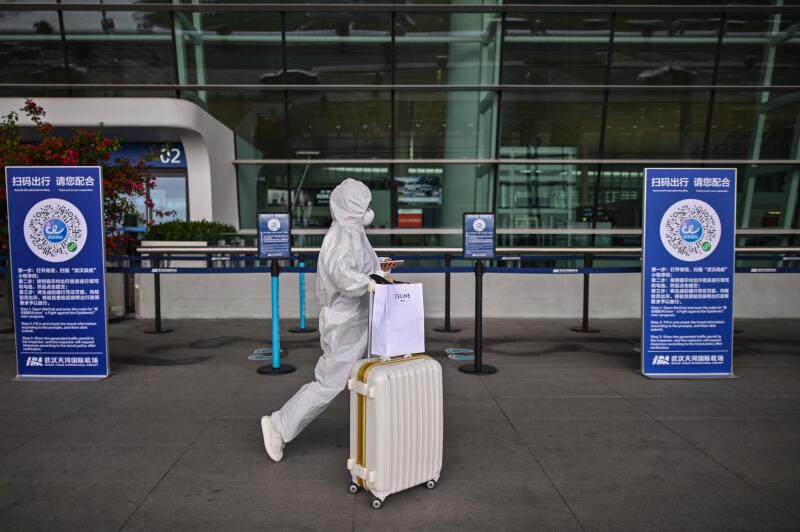COVID-19 SPECIAL
Coronavirus: Lockdowns in Wuhan, Hubei long lifted but some Chinese workers still stuck
Sign up now: Get ST's newsletters delivered to your inbox

A passenger at Tianhe Airport in Wuhan, China, on April 11, 2020.
PHOTO: AFP
Follow topic:
WUHAN - Sales executive Scarlett Li had to complete a pile of paper work, get approval from three different organisations and take a nucleic acid test for the Covid-19 virus before she could leave Wuhan for Shenzhen.
Even then, her original flight out of the city on Saturday was cancelled and she had to book again.
At the airport, there were three rounds of checks before she got on her China Eastern Airlines flight that had only 28 passengers on board.
"When I got to my estate (in Shenzhen), there were no checks and I quite easily got in until a day later when local authorities suddenly realised that I came back from Wuhan and asked me to register myself," she said.
But the 34-year-old is among thousands of more fortunate Wuhanese who work in China and can leave the city. For others who have jobs overseas, travel bans and a dearth of transport options has made returning to work nearly impossible.
Those travelling within China need to apply for permission from their local neighbourhood committee, their companies, as well as the neighbourhood committee of their destination city.
This is followed by a nucleic acid test to check for coronavirus, and depending on the destination city, a second test.
While flights and trains are gradually resuming, cities like Beijing require residents to apply for permission to return before being allowed to book train tickets, limiting only 1,000 Wuhan returnees a day.
Singaporean permanent resident Jocelyn Zhang, 36, was let go by her employer, a hair salon in Far East Plaza, after being stuck in Wuhan since the city's lockdown on Jan 23.
"They said they couldn't wait for me and with the new social distancing measures, their business has been badly affected too," she said.
Ms Zhang, who has no income since returning home to visit her parents on Jan 22, is living on her savings, and plans to go into insurance sales when she returns to Singapore.
But in the meantime she is resigned to remaining in China.
There are still no direct flights to Singapore from Wuhan and even if air routes reopen, the Republic has barred foreign travellers in a bid to curb the number of imported coronavirus cases from overseas.
"Singapore is far more expensive and without a stable job, since insurance is based on commission, I'm really worried about my finances in this economic climate," she said.
For Yale-NUS economics assistant professor Xia Xing, who left Qianjiang city in Hubei province when the lockdown lifted last month, Chongqing has provided a change of scenery.
She went to the southwestern Chinese city with her father when he returned to work, and they have been able to move around freely after taking nucleic acid tests.
But as she is not considered "essential staff", she has not been able to get the Manpower Ministry's permission to return to Singapore.
The mountains of Chongqing have allowed her to go on hikes while working remotely on her research, she told The Straits Times, but it can be difficult not having access to her books and papers.
"I am having to record everything from memory when I normally write down my plans in a notebook," said Prof Xia.
"Not being able to plan ahead is also very frustrating," she said, "but I guess this is part of the new normal that we all have to accept for the time being."
Others like project engineer Corey Zhu, have been taking the situation in their stride.
Stuck in Shiyan, a city in northwestern Hubei after he returned home for Chinese New Year, Mr Zhu, who works for an SME business in Singapore, said he has tried to remain upbeat by burying himself in work.
He bought a Chinese SIM card and, from his parents' home in Hubei, continued coordinating project operations for a site in Little India.
While his company has made multiple attempts to apply for him to return, Mr Zhu said the applications have been rejected.
"Actually, I try to look at the positive side: this has allowed me to spend more time with my parents than I have in a long time because my usual trips back are only about three weeks," he told The Straits Times from Xiangyang, another city in Hubei, where he is visiting his grandmother after being asked to take mandatory leave for six days.
"We all need to take care of ourselves and make the best of the situation and look on the positive side. There's no point being upset about something we cannot change."

